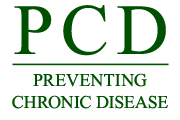PCD News Summary for July 13, 2017

Notice to News Media – PCD Release Time and Embargo Policy:
CDC’s News Media Branch releases to reporters the PCD media packet every Tuesday afternoon between 12 and 2 pm.
Embargoed until Thursday, July 13, at 12:00 PM ET
Availability and Promotion of Healthful Foods in Stores and Restaurants ― Guam, 2015
A study of healthy foods in Guam found that healthier food options in stores and restaurants were limited, but improving the availability, pricing, and promotion of healthier options could help customers make healthier choices. Guam, a U.S.-affiliated Pacific Island, has a high prevalence of obesity and chronic disease. Healthier options at stores and restaurants could help to increase consumption of healthy foods. To guide chronic-disease prevention strategies, the Guam Department of Public Health and Social Services for the first time assessed the availability, pricing, and promotion of foods in stores and restaurants. About 1 in 10 stores offered healthier foods such as lean ground meat and whole-wheat bread; most offered fruits and vegetables. Most stores in Guam were small stores and they generally had less availability and higher prices for healthier foods than large stores. Less than half of restaurants offered healthy entrees and few provided calorie information. Promotional materials in stores and restaurants commonly encouraged unhealthy eating.
Melissa Newton
mnewton@cdc.gov
404-718-6281
Age-Related Differences in Antihypertensive Medication Adherence in Hispanics: A Cross-Sectional Community-Based Survey in New York City, 2011–2012
New research finds low numbers of Hispanics are properly following recommendations for taking their prescribed blood pressure control medication; younger adults are significantly less likely than older adults to have high adherence to taking medication. This cross-sectional study included 1,043 community-dwelling Hispanic adults with hypertension living in three northern Manhattan, New York, neighborhoods from 2011 through 2012. Prevalence of high adherence to antihypertensive medication was significantly lower in younger adults compared with older adults. In younger adults, heavy alcohol consumption, a longer duration of hypertension, and recent poor physical health were negatively associated with high adherence; poor self-rated general health was positively associated with high adherence. In older adults, advancing age, higher education level, high knowledge of hypertension control, and private insurance or Medicare versus Medicaid were positively associated with high adherence; recent poor physical health and health-related activity limitations were negatively associated with high adherence. Researchers say evidence of these age-related differences highlights the importance of developing approaches tailored to the specific life stage of people with hypertension.
Melissa Newton
mnewton@cdc.gov
404-718-6281
###
Note: Not all articles published in PCD represent work done at CDC. In your stories, please clarify whether a study was conducted by CDC (“a CDC study”) or by another institution (“a study published by CDC”). The opinions expressed by authors contributing to PCD do not necessarily reflect the opinions of CDC or the institutions with which the authors are affiliated. PCD requests that, when possible, you include a live link to the article in your stories.
###
U.S. DEPARTMENT OF HEALTH AND HUMAN SERVICES
CDC works 24/7 protecting America’s health, safety and security. Whether diseases start at home or abroad, are curable or preventable, chronic or acute, stem from human error or deliberate attack, CDC is committed to respond to America’s most pressing health challenges.